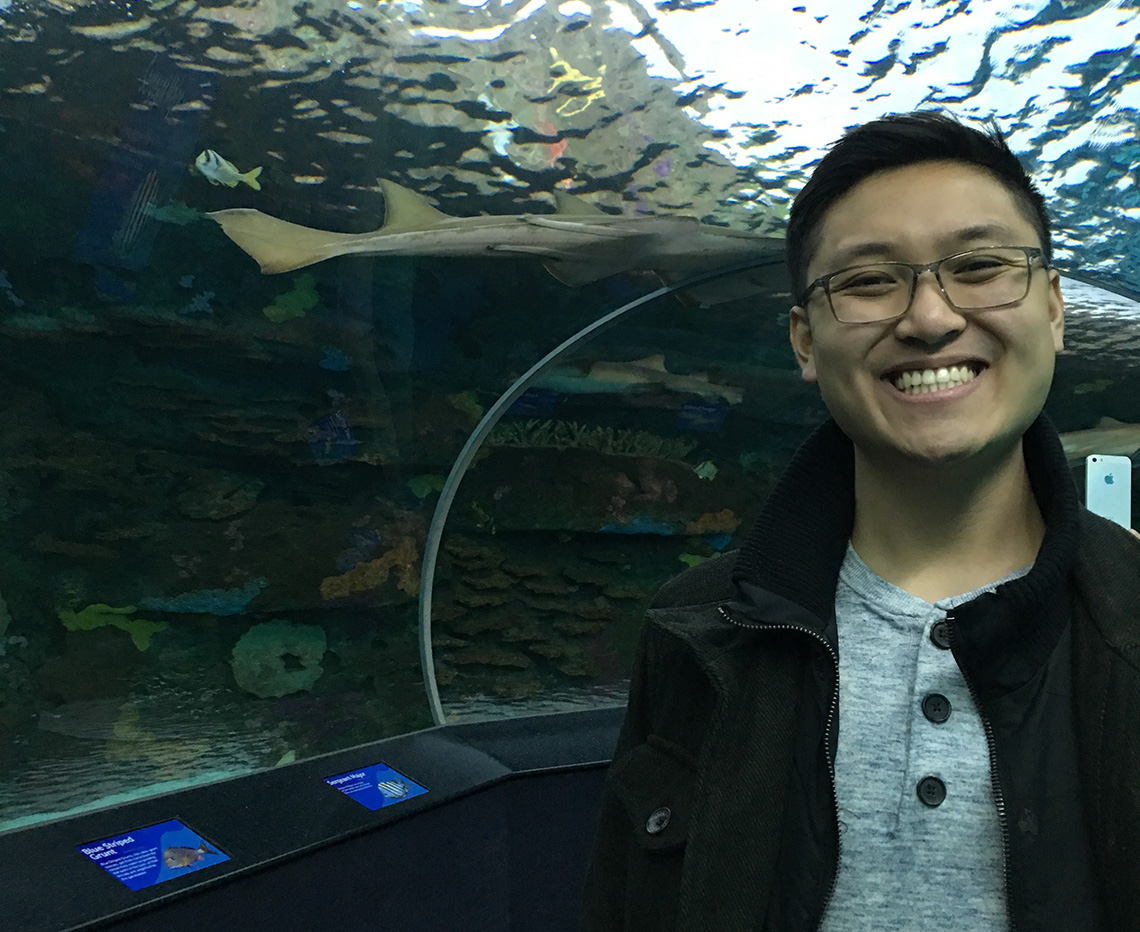Humans of OAC
Marlene Morris
She/Her
Conference Co-ordinator, Ridgetown Campus Conference and Facility Services
Marlene's email, Marlene's LinkedIn

What does your job entail?
For more than 20 years, I have worked with Conference and Facility Services as the conference co-ordinator. We host internal and external groups on campus including day meetings, conferences and special events. We deliver ‘one-stop shopping’ at Ridgetown by co-ordinating room bookings, hospitality services, facility set-ups, equipment requirements and more depending on the client needs. I have the privilege to work with incredible people and many diverse groups. When I retire, I fondly joke that I will write a best-seller book about my numerous adventures in this role.
While working through numerous COVID-19 challenges, I adjusted to meet campus needs and was able to support the Business Development Centre program operations. Additionally, throughout the past year my role has expanded and I have been assisting communications and engagement recruitment initiatives. Working with other campus teams has increased my skill set and my understanding of our campus priorities. Most recently, organizing and hosting campus tours has provided me the opportunity to work with current and future students and it has been so rewarding to see them on their post-secondary journey.
At the end of the day whether you are a visitor, staff or student, I do my best to ensure you have a positive Ridgetown Campus experience.
What is your favorite thing about working for the Ridgetown Campus?
A couple of my favourite things about working at Ridgetown Campus are the people and the “small town community” vibe that Ridgetown Campus offers in rural southwestern Ontario. The Ridgetown Campus is my home away from home! For being a small school, the campus offers plenty of green space, more than 750 species of plant life on campus, research plots, large animal barns, small animal colonies, and much more. My favourite time of the year on campus is the fall with the multitude of autumn colours that await each day. Ridgetown Campus people are friendly, caring and polite. I look forward to coming to work each day and grateful for employment at the University of Guelph Ridgetown Campus.
When you are not working how do you like to spend your time?
When I am not working, I enjoy spending time with my family, friends and the great outdoors. Camping, or should I say “glamping”, is the perfect way to discover new places and enjoy nature while deepening family bonds. Some of my favourite trips include the East Coast of Canada, Ottawa, Quebec City and New York and Pennsylvania States. Who knew that the rocks at Peggy’s Cove would entertain my children for hours on end? Aside from work, I coach CanSkate which is a learn to skate program for children and youth. Figure skating has been a life long passion of mine. I am excited to share the challenge and love of skating with others, especially young children who share their huge smiles.
What drew you to work in higher education?
The opportunity to encourage those entering higher education and be supportive of colleagues who are directly involved with higher education are primary motivators of my love for my work. I feel that my conscientious effort, dedication to my craft, and positive mindset help to fortify the amazing teams here at Ridgetown Campus.
What is something you would recommend fellow staff members trying out?
I would recommend exercising for physical and emotional well being. Whether it is walking or participating in a 10 km race … get moving! You feel so much better when you exercise. It is a tremendous stress reliever and sets the path for a healthy lifestyle. Some advice that I tell my teenagers and potential students is “to get involved.” Join a committee, associate with your fellow staff and get immersed in connections.
Kamini Khosla
She/her
Lab manager in Dr. Kari Dunfield’s Molecular Ecology Lab, School of Environmental Sciences
Kamini's email, Kamini's LinkedIn
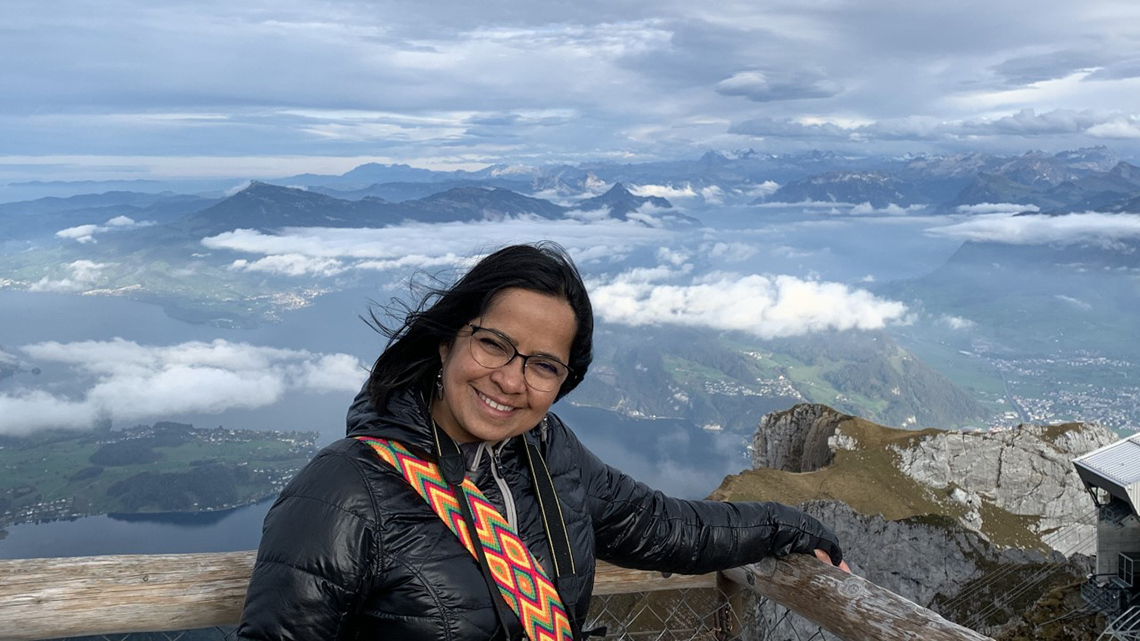
What does your job entail?
For the last 15 years, I have been engaged in the day-to-day, smooth operation of the research lab for Dr. Kari Dunfield in the School of Environmental Sciences (SES). In addition to contributing to the vast research work, I have also been responsible for developing best lab practices and efficient SOPs, providing leadership, coaching, mentoring, performance management and technical support to a diverse team of researchers, including grad and undergrad students.
What is your favourite thing about working for SES?
One of the top development goals of the United Nations is to achieve “zero hunger” by the next decade, which is directly linked to sustainable agriculture practices.The goal relies on improving our knowledge and understanding of ecosystem services and their role in sustainable food production.
SES, under the OAC umbrella, is a hub for collaborative research that plays a crucial role in bridging this knowledge gap.Our school also trains and equips future Highly Qualified Personnel with the knowledge and experience they will need to face challenges associated with climate change on food security.
Working in Dr. Kari Dunfield’s microbial ecology research lab, these goals are at the forefront of my daily work plan. As a part of a diverse team of postdocs and grad students focused on deciphering the impact of agricultural practices on biodiversity, particularly on soil microbial communities and their functions, each day at work presents me with an opportunity for personal growth, which I think is the favourite part of my job.
And, even if on a microscopic level, being part of a solution for our future generations makes me proud to be a member of the OAC community.
When you are not working how do you like to spend your time?
I have a passion for travelling. My partner and I have visited more than 25 countries spanning around four continents and counting. Canada is still one of my preferred places to live, work and enjoy life. I would certainly recommend everyone to try a coast-to-coast road trip from the beautiful mountains in British Columbia to the Cabot trails in Nova Scotia. Now, the top of my bucket list is the aurora borealis.
What drew you to work in higher education?
I believe that education and awareness are the keys to growth and continued success on personal and community levels. Once you are convinced with this philosophy- working in the higher education sector seems the most logical and parsimonious career path.
What is something you would recommend fellow staff members trying out?
Fyodor Dostoevsky as my favourite author, although my current favourite list is long and constantly evolving "The God of small things" by Arundhati Roy and “Ramayana” by Narendra Kohli (Hindi) are my all-time treasured titles. For a podcast, I thoroughly enjoy and would recommend, "Philosophize This" by Stephen West.
Nick Le
He/him
Academic assistant to associate dean, academic, OAC Dean's Office
Nick's email, Nick's LinkedIn
What does your job entail?
My job is to support the associate dean, academic (ADA) and assistant deans with processing course and program changes to the Undergraduate Calendar and Associate Diploma Calendar. Our goal is to provide a constant improvement in the quality of our education that is being delivered. The ADA, assistant deans and I work with staff, faculty, and students in program committees to discuss the types of changes proposed in our calendar. I support the ADA and assistant deans with academic misconduct cases by attending meetings with students and ensure the policy and procedure is met in each case.
What is your favorite thing about working for the OAC Dean’s Office?
My favourite part of working for the OAC Dean’s Office is coming back to campus to work in Johnston Hall. The building is beautiful with the wood accent, it makes it a great environment to work in. On top of that, the campus itself is my favourite. Being an alumnus, I grew attached to this school and nostalgic to all its features. During my breaks, it feels nice to walk down memory lane (literally).
When you are not working how do you like to spend your time?
I like to spend time with my friends and family. I do like ‘me time’, but I enjoy sharing experiences with people. I enjoy exploring new foods and attempt to re-create them. Like most people, I like to stream tv shows and movies, but especially re-watching something I enjoyed and critically analyzing the vision the writers and director had when creating it.
What drew you to work in higher education?
The University of Guelph is something familiar to me as I did my diploma and undergrade degree here. When I graduate from the HR Management Diploma program, I stumbled upon the OAC. Working in higher education was not the initial plan, but rather looking for a place to grow and develop new skills. As I started working here, I became more involved with the type of work I was doing and better acquainted with the people I worked with. The OAC team has made it very easy to feel like you belong, everyone has so much respect for each other.
What is something you would recommend fellow staff members trying out? And why?
If I can recommend anything to my fellow staff is to re-try an old hobby. It’s as easy as riding a bike.
Aaron Fairweather
(they/them)
PhD candidate and lecturer, School of Environmental Sciences
Aaron's email, Aaron's LinkedIn, Aaron's Twitter or you can find them on all social media at @entobird

What does Pride mean to you?
For me, pride month is the opportunity to be grateful for being able to be open and unapologetically myself with my community of peers. It's an opportunity to give thanks to those that have come before me, who faced the discrimination, criminalization, and inequality of rights. For those that lived through the riots and oppression. To carry that forward by fighting for those who are still fighting to be seen and heard, by being seen and heard. It is also a reminder of the journey I’ve been on, and the Pride’s I’ve taken to be more open about myself with those I love, and my broader community. A reminder of how grateful I am for that. And that I want to keep creating a space where others like me can do the same.
How will you be celebrating Pride?
I will celebrate it with my loved ones, the friends and family that respect and support me. I like to re-visit the big moments in my life where I’ve come out or opened up. Sometimes that’s having conversations with those loved ones about those moments, their thoughts and feelings as the years have gone on. Sometimes that’s reading through valued e-mails, texts, or letters I’ve had with mentors, family, friends who have reached out to support me during those tough transition periods in my life. Also, after two long years of the pandemic, I am planning on marching in the Toronto Pride Parade on June 26th with a costuming community I am a part of! Celebrating with friends in the best, loudest way possible.
Why is Queer visibility in STEM and academia important?
Queer visibility in STEM and academia is crucial, as it provides a sense of belonging in this field to those that may otherwise feel ostracized or unwelcome. Some tote science as a discipline that is objective and unbiased; its goal is to seek the truths of the universe without influence. However, science is conducted by people, and people are biased. We all have our external and nurtured influences, some more malevolent and exclusionist than others. Repeatedly, we have seen how biased people and infrastructure of science are, including at this institution. Part of working towards a more accepting, open, and diverse field is the visibility of those like yourself. Seeing yourself in another successful member of a discipline can encourage someone to work towards their goal when they might otherwise be discouraged to do so. This diversity of thought, experience, and identity adds additional, valuable insight into scientific endeavours that may otherwise be stifled without that perspective. Sometimes, seeing others live through similar struggles to reach success, and some level of comfort, can be lifesaving.
What is your area of research?
I like to shed light on those organisms’ people often overlook, in places people generally don’t consider. Currently, that is ants in the agricultural systems of southern Ontario. We know nothing about their diversity, role, or how we are impacting ants in these systems. I have spent my thesis investigating what ants we find in these agricultural crop fields, what they’re doing in and around these crops, how practices like pesticide use impact them, and why that matters for the future of this industry.
What is your favorite thing about studying/working in the School of Environmental Sciences (SES)?
The people! I have met many incredible students and faculty while here. When I was in middle school, I first read through Stephen Marshall’s Insects: Their Natural History and Diversity, and ever since, it was my childhood dream to be a member of this department. I could not be happier to be here doing graduate work, and to have met many of my academic heroes. Better still, I count so many here as friends and valued mentors. The space that SES, its members, and their expertise have provided me has further fuelled my passion for entomology and science. From my supervisors Dr. Nigel E. Raine, and Dr. Jonathan Schmidt, to new inspirational faculty like Dr. Andrew Young and Dr. Jesse Popp.
When you are not studying/working how do you like to spend your time?
Typically, I spend my time outside of work/schooling being in nature and a huge nerd! I love cosplaying and costuming, and the marvel of insects has been such a core part of my life that I like to combine the two. I spend a lot of my free time creating science communication content within nerd subcultures and fandoms via social media, videos, streaming, etc. I love to garden, hike, explore the local flora and fauna in Ontario’s beautiful parks and natural areas; sometimes that material makes it into my sci comm content too! If I’m not outside or doing sci comm, I like to rock climb, play board games and video games, all while relaxing with my partners and friends.
What is something you would recommend fellow staff members trying out? And why?
I’ve got a few recent favourites! One of my all-time favourite books is How to Understand Your Gender: A Practical Guide for Exploring Who You Are by Alessandra Iantaffi, and Meg-John Barker. It was instrumental for me in navigating my identity. It really changed my life for the better, by helping me accept myself and others. Even if you are not questioning your identity or sexuality, it may give you more insight into the lives of those who are, and their struggles. A Quick & Easy Guide to They/Them Pronouns by Archie Bongiovanni, and A Quick & Easy Guide to Queer & Trans Identities by J.R. Zuckerberg and Mady G. are similarly great reads. I have been loving Just The Zoo of Us and Nerdin About (presented by Nerd Nite Vancouver) podcasts. They have a wonderfully diverse range of guests, with an awesome commentary on current issues and the diversity of topics, people, and life on our planet. Lastly, I would recommend rock climbing to anyone! It has been a lifesaver during my graduate work, keeping me active and a place to decompress after a long day at the lab. The Guelph Grotto just re-opened on Victoria Road; if anyone wants to give it a shot hit me up! I am there most days.
Bradley Howie
(he/him)
Anishinaabe Environmental Educator, the Arboretum
Bradley's email, Bradley's LinkedIn
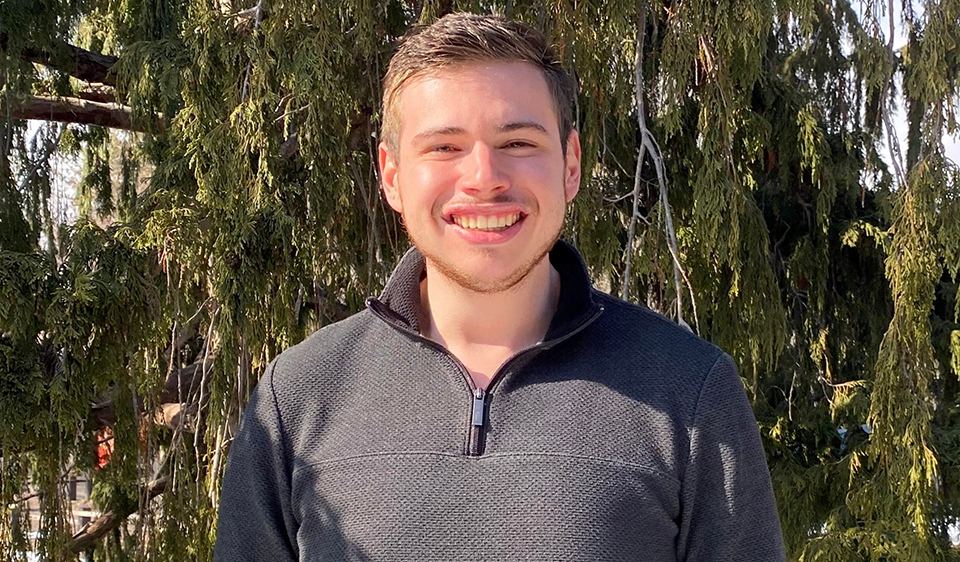
What does your role as Anishinaabe Environmental Educator at The Arboretum entail?
My role at the Arboretum is interdisciplinary. I work as part of the naturalist team under Chris Earley (interpretive biologist and education coordinator at the Arboretum). In this aspect of my role, I help the naturalist team create programming and educational materials that promote understanding and connection with the flora and fauna of the Arboretum. I am honoured to also have a role where I weave traditional Anishinaabe knowledge systems into my teaching practice and foster land-based learning here at the Arboretum.
What project are you most excited about?
The project I'm most excited about is leading workshops on an Introduction to Anishinaabe bimaadiziwin (path or life). For these workshops I was given full creative control to weave art, culture, language and science into two workshops. I'm excited to give these workshops because my biggest passion in life is to teach people. These workshops aren’t a typical lecture style but will be more like storytelling. If you're interested in attending these workshops you can sign up here.
Could you elaborate on the concept of land-based teaching?
I have thought and reflected about this question quite a bit. The way I have come to understand it is that, in outdoor education one teacher is on the land teaching about the land. Whereas in land-based teaching Aki ‘Earth’ is the teacher, and she is just using your voice to share her gifts. It’s not just teaching about a specific plant or animal on the land. It’s about getting out on the land, experiencing the land with your body, with your mind, with your spirit, and with your emotions. Understanding the deep connection that you have with creation and that the rest of creation has with each other.
What is your favorite thing about working for The Arboretum?
I have a few favorite things about working at The Arboretum. One of them is working in a lovely green space. It's tremendous that when I just want to get away for a second, I can go outside and I can see the birds, I can hear the wind, and I can feel the trees. My other favorite thing about this position is that I get the opportunity to be creative and artistic while I'm teaching.
What is your dream career?
My dream career is to become a lecturer for a post-secondary institution and teach Anishinaabe environmental science or chemistry. I want my students to feel respected and valued in the classroom. Creating and delivering fun and engaging lectures that are accessible for any learning type.
When you are not working how do you like to spend your time?
When I'm not working, I like to go out hiking and look for all the cool plants, animals, and fungi that we share the landscape with. I also enjoy cooking, kickboxing, and yoga. Lastly, I love to tutor organic chemistry, which might not be everyone’s cup of tea. I enjoy tutoring organic chemistry because I find often that it's not necessarily the difficulty of the information rather its accessibility. I like helping learners and enabling them to access the information, so it finally starts to click for them. It gives me that warm feeling in my heart.
What is something you would recommend fellow staff members trying out? And why?
One thing that I would recommend fellow staff members should try is to go out and walk the land with an Indigenous Elder or an Indigenous Knowledge Holder. Personally, I find these experiences entirely eye opening. Not only do the Elders and Knowledge Holders share knowledge about the land and the various flora and fauna, but they share teachings about life in general and how to move through it.
Christina Lockerbie-Thom
(she/her)
Agricultural Assistant, Ridgetown Campus Dairy Barn
Christina's email
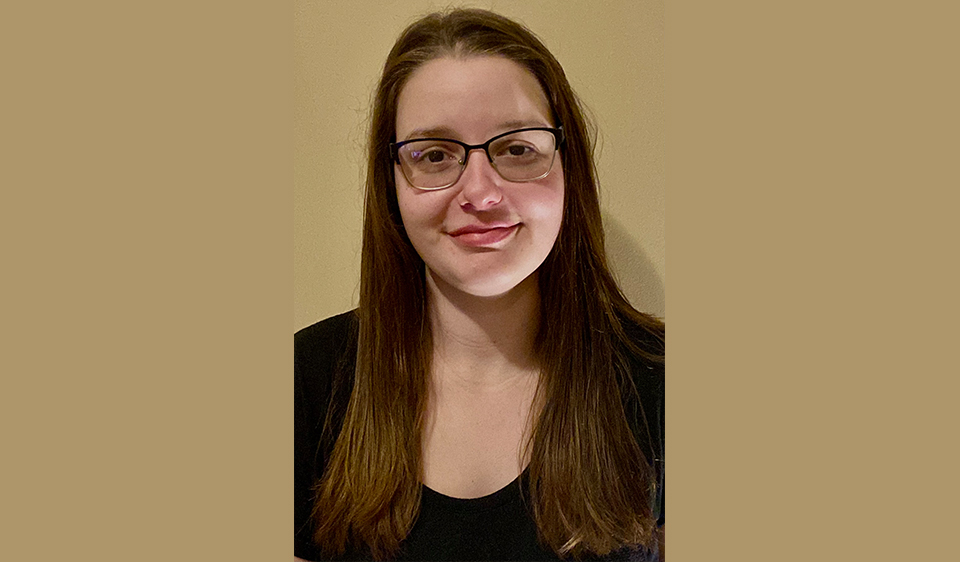
What does your job entail?
I am lucky to be able to work in the campus dairy barn and tend to all the needs of our lovely ladies. These duties include feeding, milking, regular health checks and daily record keeping. As well within my role I work with the students to assist them during their hands on learning opportunities at the dairy barn.
How have you adjusted to the changes brought by COVID-19?
Only a few minor modifications were needed in the livestock department to ensure our team safety. So fortunately for myself I have not had many adjustments. Since the cows depend on us everyday, our team was not working from home or any significant changes to the daily tasks.
What is your favorite thing about working for the Ridgetown Campus?
One of my favourite things about working for Ridgetown Campus is all the learning opportunities working within the large organization of wonderful people that is at the forefront of research and education that allows for us to network and share our knowledge.
When you are not working how do you like to spend your time?
In my free time I enjoy spending time with my family and friends in the great outdoors; hiking with my dog, four-wheeling and spending time at the family farm or cottage.
What drew you to work in higher education?
I have had a passion for education and a love for agriculture from a young age. Therefore, after completing my studies at the Ridgetown Campus, and gaining so much knowledge of the agricultural industry from the talented and knowledgeable educators I knew I wanted to be apart of helping to teach the future leaders of the agricultural industry. Therefore, once the opportunity to support the dairy education on campus came up, I knew it would be a great fit.
What is something you would recommend fellow staff members trying out? And why?
An activity I recommend is horseback riding. The reason being is the connection you get to build with a horse and peacefulness of riding in sync with such a large, beautiful animal.
Carie Devitt
(she/her)
Program Counsellor (BIESP, B.Sc.(Env.) and DTM), OAC Dean's Office
Carie's email
What does your job entail?
My job involves helping students with things like understanding university policies and diploma/degree/major requirements for graduation. I help with recruitment events and work closely with faculty advisors and admissions counsellors (and many others too!). I also sit on program committees for all of the programs I work with. Although my physical work location has changed during the pandemic, I am still able to meet with students, attend meetings, and host recruitment events virtually.
How have you adjusted to the changes brought by COVID-19?
I have a home office now, which I never had before! We have had to bump up our internet speed to keep up with the demands of our household. I meet with students via Microsoft Teams which allows for screen sharing and sharing of links and referrals during meetings which works really well. I have the undergraduate calendars and all the information I want to share with students at my fingertips.
What is your favorite thing about working for the OAC Dean’s Office?
My favourite thing about the OAC Dean’s Office is being part of an awesome team! Melinda Vanryn is the other program counsellor in our office and has been an amazing mentor to me over the years. Melinda inspires me every single day.
When you are not working how do you like to spend your time?
I love hanging out with my kids and watching them play sports. I am a hockey mom and a figure skating mom, so I spend a lot of time in arenas! We are also a farm family so when I am not working or at the arena, I am at our farm – or the beach.
What drew you to work in higher education?
I have always loved the University of Guelph. I did my BA at Guelph (and my MA at the University of Windsor). When my family decided to move back to Guelph many years ago, I knew the University was where I wanted to work. I love being surrounded by thoughtful, hardworking, genuine, and sometimes quirky people!
What is something you would recommend fellow staff members trying out? And why?
My family plays board games together whenever we can. We played Othello for the first time over the holidays. It is a really old game that is easy to learn, but hard to master. My current favourite game is Quirkle. If you enjoy playing games, I highly recommend both of these!
Sara Stricker
(she/her)
Communications and Outreach Coordinator, Guelph Turfgrass Institute (GTI)
Sara's email, Sara's LinkedIn, Sara's Twitter, GTI Twitter
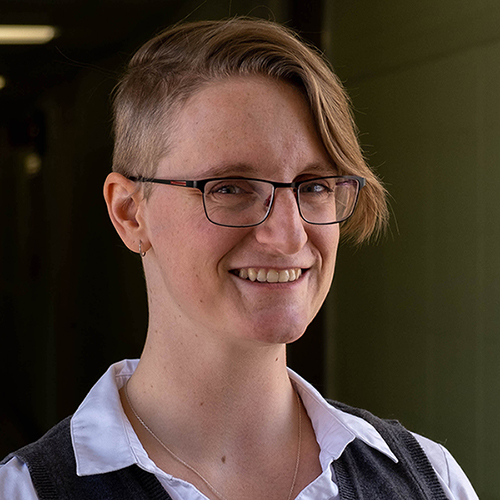
What does your job entail?
As the communications and outreach coordinator at the Guelph Turfgrass Institute (GTI), my job includes managing the website, social media, and professional trade articles that promote the research conducted at the GTI. I will be teaching the Turf Environmental Management course and part of the Turf Manager’s Short Course next semester. Additionally, I am responsible for various administrative duties at the GTI.
How have you adjusted to the changes brought by COVID-19?
Most outreach events would typically be in-person. In following the recommendations from public health, we have opted to host the annual Ontario Turfgrass Symposium as an online webinar in 2021 and 2022. Hosting online events opens the door to new challenges and opportunities. For example, the attendees can view all sessions because the sessions are recorded online, whereas attendees are limited to attending one of three concurrent sessions at the in-person event. On the other hand, a challenge of using an online platform is providing the same level of networking and personal connections associated with an in-person event.
What is your favorite thing about working for the Department of Plant Agriculture?
I enjoy the diversity of tasks associated with this role. Every day is something new!
When you are not working how do you like to spend your time?
I like to draw, paint, and do other crafty activities.
What drew you to work in higher education?
I’ve always been interested in sciences and I grew up asking questions. Working at the University of Guelph allows me to be involved with research, teaching, and science communication.
What is something you would recommend fellow staff members trying out? And why?
I highly recommend the podcast called Ologies, by Alie Ward. This podcast covers various topics from noses to bats to beauty standards and everything in between. It’s easy to listen to and you always learn something new.
Steve Paiero
(he/him/his)
Curator of the University of Guelph Insect Collection, School of Environmental Sciences
Steve's email, U of G Insect Collection: website, Twitter, Instagram
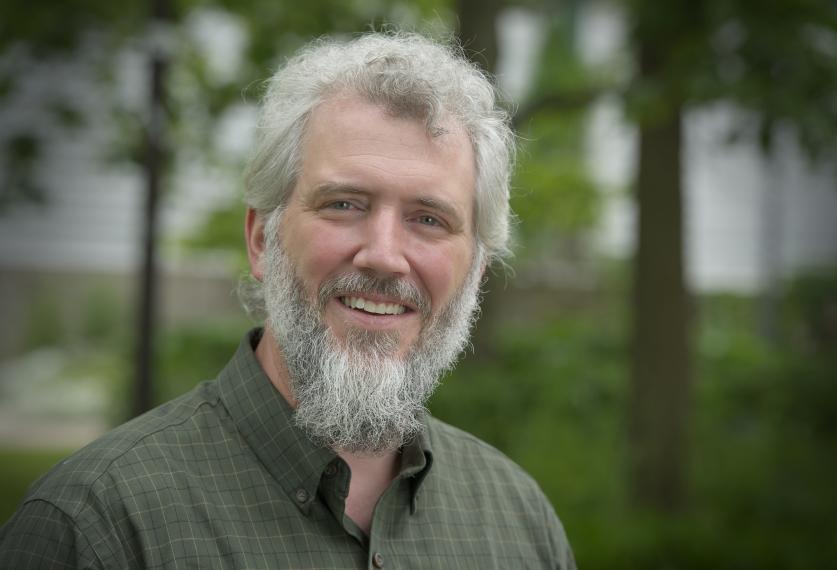
What does your job entail?
My role as curator of the University of Guelph Insect Collection has two major parts: to maintain and develop the insect collection and to enable it to be used in research and education by members of both the University of Guelph and the broader scientific communities. The University of Guelph Insect Collection is housed in the Edmund C. Bovey Building and contains close to four million specimens, all with associated data, and is supported by the School of Environmental Sciences. It includes a significant holding of true flies (Diptera) developed from historical and ongoing research by Dr. Stephen A. Marshall and his associates, a strong provincial collection representing historical material dating from pre-confederation, and reference material to aid in the identification of North American insects and education of undergraduate and graduate students. This material requires ongoing care to ensure that specimens are properly stored and prepared that allows their use in research and education. Development of the collection includes both identification of material to more refined taxonomic levels and acquisition of new material that enhances the collection for research or education; this new material can be acquired either through access to material made available to us from other collections or from directed collections by myself or other collection associates. As an important international collection of true flies, I am also responsible for ensuring access to material by the international community, by providing a synopsis of our holdings for specific taxa and preparing and arranging loans for study.
As a member of the staff, I have other roles including acting as one of the buildings fire wardens and sitting on the safety committee. I have also been involved in outreach events through OAC to foster interest in the University of Guelph by high school students.
How have you adjusted to the changes brought by COVID-19?
As curation of a physical collection that requires hands on work, moving remotely has been difficult. Some of the research aspects have been directed to insects that do not require as much preparation and study to be able to work at them at my home office, but ongoing specimen preservation and preparation often necessitates visiting the collection on a weekly or biweekly schedule. These efforts have also been aided by graduate students who are doing research in the collection during their short visits to the collection. Some field sampling to enhance ongoing biodiversity studies were limited due to restrictions on travel or avoiding potential exposure both this year and last year, as sampling insects can be time sensitive due to their flight periods. Thankfully, the use of the collection in research by the broader community has not been significantly limited as personnel at the University of Guelph mailroom has continued to aid us in shipping material for research elsewhere and receiving material for our own study.
What is your favorite thing about working for the School of Environmental Sciences?
The School of Environmental Sciences is a great environment to work within due to the diversity of research and because of the people involved in it. The breadth of research within our school encompasses so many elements that are unique research streams but also very much interconnected. Our professors and staff are amazing and always helpful, and I have had the pleasure of getting to know many of them over the years.
When you are not working how do you like to spend your time?
I have always had a passion for the outdoors, which is partly what drew me to entomology; there are insects everywhere. I can often be found in municipal wood lots or on friend's farms wandering about looking for interesting fungi, plants, and, of course, insects.
What drew you to work in higher education?
After taking my introductory entomology class at the University of Guelph, my passion for the natural history of insects really exploded. My exploration of the insect diversity made me realize how much there is still unknown awaiting us to discover and explore it. The support of the entomological community also helped foster my interests and I try to pay this forward in students exploring entomology for the first time.
What is something you would recommend fellow staff members trying out? And why?
I have three recommendations for anyone wondering about the natural world. Two classics, in my mind, are Thomas Eisner’s “For the Love of Insects” and David Quammen’s “Song of the Dodo”. Both explore natural history and touch on the wonder of studying insects. My third recommendation is to check out Stephen Marshall’s “Insects: Their Natural History and Diversity”. Although this is used as a university textbook, it brings many of the insects around us much closer by introducing us to the various insect groups and their life history.
Donna Hancock
(she/her/hers)
Forage/Growth Facilities Research Technician, Department Of Plant Agriculture
Donna's email
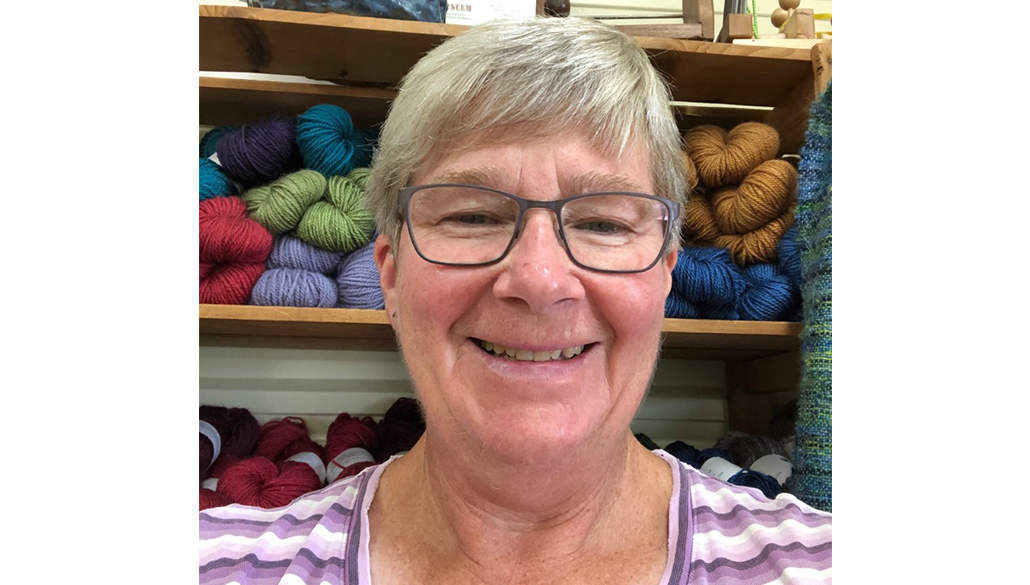
What does your job entail?
My position is split between the Forages and Growth Facilities in the Crop Science building. The growth facilities portion involves ordering supplies for users and helping students and staff with their needs in the facility. I also look after the invoicing for the use of the growth facilities, in both Bovey and Crop Science buildings. In the forage part of my job, I have been working on forage research for 39 years. It has involved ensiling of forages, breeding of forages, and most recently, forage management and cover crops for grazing or stored feed. I have assisted with the teaching of Managed Grasslands (CROP*3340) in the last few years, which I have really enjoyed.
How have you adjusted to the changes brought by COVID-19?
The biggest adjustment has been coming up with a way to teach the identification of forages in a virtual world.
What is your favorite thing about working for the Department of Plant Agriculture?
There are a couple of things I like about working in Plant Agriculture. One is the opportunity to work with students from all over the world. The other is in research, we are always starting new projects every year, so it is constantly changing which makes it very interesting. Never the same old thing that we do, so it keeps things fresh. Working in forages has allowed me to represent U of G on several committees outside the university such as the Forage Crop Committee (defunct), Ontario Forage Council, and the Field Crops Committee at the Royal Winter Fair.
When you are not working how do you like to spend your time?
I spend my time working at my business Wellington Fibres, which is a business that goes from farm to fashion. I have a herd of Angora goats that produce mohair and my three employees and myself transform the fibre into yarn which we sell for people who create clothing. As well as processing our own fibre, we also process other fibre producers’ fibre from all over Canada. Recently we have been involved with a weaver from Toronto, for whom we have spun yarn. She is weaving yardage for the Smythe 100- Mile Blazer in conjunction for the Wool Campaign for the month of October.
What drew you to work in higher education?
After graduating from OAC in 1982 with a degree in agriculture with a specialization in crop science, I was interested in working in research in the area of forages and there was a position available at that time. I have been here much longer than I anticipated but it has all worked out.
What is something you would recommend fellow staff members trying out? And why?
I had started doing pilates eight years ago. I wish I had started much earlier in my life. A strong core can make your life much more active as we age. Since we are all going to do that, it is a good reason to suggest to my fellow staff members. I would also like to say that the instructors at “Pilates in Guelph” are excellent.
